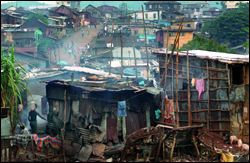
Happy World Health Day, all. This year’s theme is “Urbanization and Health”, highlighting the impact of increasing urbanization on public health. There are a number of articles highlighting the rise in urbanization and the contributions and challenges to health that living in cities presents. If you’re interested, check out the WHO’s official World Health Day site. They have also set up a pretty snazzy social media site that showcases stories from cities around the world.
As I puttered around the WHO site, I found myelf intrigued by one of the latest buzz phrases that is making its way into the public health lexicon. Lately, everything seems to be about the “social determinants of health”, or in layman’s terms, the social and economic circumstances which greatly influence our health outcomes. This topic was largely an academic one until the WHO got the practitioner conversation going in 2003 when they published “Social Determinants of Health: the Solid Facts“.
The crux of the issue is this: poorer people live shorter and less healthy lives than richer people. This has been common knowledge since Friedrich Engels began exploring the links between poverty and disease in the working class neighborhoods of England in the mid-1800’s. So why the recent buzz, and why the global focus?
While I’d like to claim “altruism”, I’m pretty sure there is a pragmatic angle. I’d link it to globalization, and an increasing realization that the health of strangers in other countries will have an impact at home. See, when health was just a dialogue between doctors and their patients, the social determinants of health were largely a private concern. Your doctor talked to you about the conditions of your livelihood, and made recommendations based on your personal circumstances and the resources available to you.
But all of that has changed: it is now recognized that your health is one element of a system, meaning that your health, and that of your family and community, will greatly impact the well-being of your country’s economy. Politicians care about economies, possibly more than they care about the health of their constituents (ok, that was a bold statement). And now that globalization brings more people into contact, and more economies into contact, in ever-more-complex ways, the livelihood of communities is dependent on the health and well-being of other communities in far-flung geographies. If this train of thought is interesting to you, check out the extremely thought-provoking work by Canadians Labonte & Schrecker on Globalization and Health.
All of this goes back to the conversation that was started in the late 1970’s, when the United Nations declared at Alma-Ata that our global community should pursue “health for all”. This sounds like a cry for social justice, but I’d argue that, in fact, it was the result of startling realizations that first-world livelihoods were threatened by third-world instabilities. Today, as health crises are played out in an ever-increasingly inter-connected world, I believe that leaders (or at least the enlightened ones) are seeking methods to stabilize systems as a long-term risk mitigation strategy. Since health is one of the foundations upon which stable societies are created, it is increasingly important to analyze and incorporate all of the determinants that factor into the functioning of a healthy community and society.
It’s a circular argument, I’ll concede, but one that bears thought as we celebrate World Health Day.
By the way, out of interest, I checked out Wikipedia’s historical listing of previous World Health days – I found the list to be a fascinating retrospective on how the global health conversation has changed over the years. Here are the themes from the last 15 years: